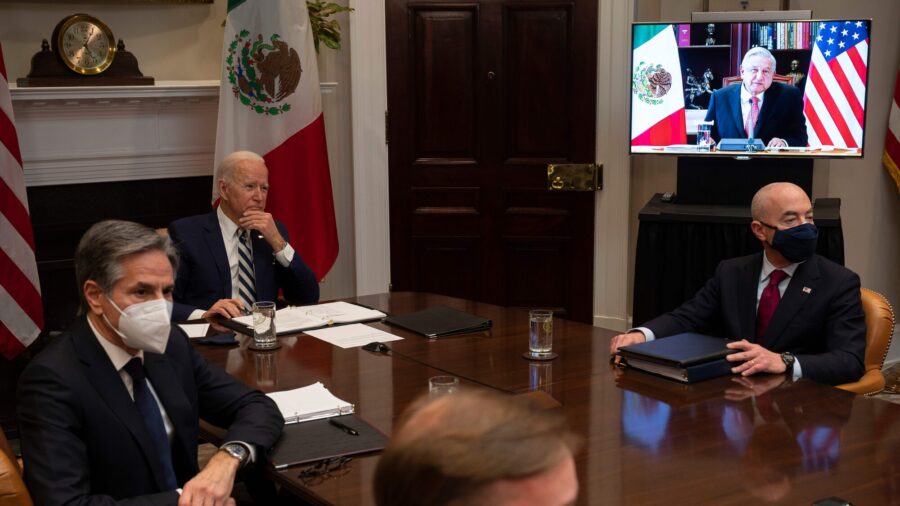President Joe Biden and Mexican President Andres Manuel Lopez Obrador joined in a virtual bilateral meeting on Monday where the two leaders discussed immigration, commitments to combat the CCP virus pandemic, and explored areas of cooperation on climate issues.
Lopez Obrador has been Mexico’s president since December 2018, limited to a single six-year term.
“The United States and Mexico are stronger when we stand together. There’s a long and complicated history between our nations, and haven’t always been perfect neighbors with one another, but we have seen over and over again the power and the purpose when we cooperate,” Biden told Lopez Obrador in remarks in front of the press ahead of their virtual meeting. “And we’re safer when we work together, whether it’s addressing the challenges of our shared border or getting this pandemic under control.”

Lopez told Biden, “I believe our countries will allow us to develop jointly in these dire times. Integration will strengthen both our countries as we are faced with this inevitable expansion of other regions. Our relations are strategic. … We are very thankful that you are willing to maintain good relations for the good of our peoples in North America—the Canadian, the United States, and the Mexican peoples.”
Immigration
In a joint declaration released after the meeting, the leaders committed to “immigration policies that recognize the dignity of migrants and the imperative of orderly, safe, and regular migration. The two countries also said they would work together on a joint effort “to address the root causes of regional migration, to improve migration management, and to develop legal pathways for migration.”
“Respectively, [Biden and Lopez Obrador] directed the Secretariat of Foreign Relations and the Department of State to engage with the governments of neighboring countries, civil society, and private sectors through policies that promote equitable and sustainable economic development, combat corruption, and improve law enforcement cooperation against transnational criminal smuggling networks,” the declaration reads.
The White House on Jan. 23 announced that Biden, in a call with the Mexican president, “outlined his plan to reduce migration by addressing its root causes, increasing resettlement capacity and lawful alternative immigration pathways, improving processing at the border to adjudicate requests for asylum, and reversing the previous administration’s draconian immigration policies.”

Ahead of the bilateral meeting, Lopez Obrador suggested a “Braceros”-style immigrant work visa program in the United States for what he estimated to be 600,000 to 800,000 Mexican and Central American workers per year. He said on Saturday that the United States will need temporary immigrant workers from Mexico to sustain economic growth. When asked about the matter, White House press secretary Jen Psaki said she believed reinstituting the effort would require action by Congress.
The “bracero program” was negotiated between the governments beginning in 1942, and it provided many protections for the “braceros,” Mexican migrant workers, including contracts, housing, minimum wage or prevailing wage, and a minimum number of days of work, according to the Southern Poverty Law Center (SPLC). But there were many abuses and it was abolished in 1964.
CCP Virus
On the response to the CCP (Chinese Communist Party) virus, the leaders agreed to “deepen cooperation” in both CCP virus-related economic and health areas. Specifically, the cooperation will include “enhancing public health capabilities, information sharing, and the development of border policies,” according to the joint statement.
While Biden told a reporter prior to his meeting with Lopez Obrador that they would talk about whether the United States would send vaccines to Mexico, there was no mention of vaccine distribution in the joint statement.
White House press secretary Jen Psaki said at a press conference prior to the meeting on vaccine distribution, “The administration’s focus is on ensuring that every American is vaccinated. And once we accomplish that objective, we’re happy to discuss further steps.”
Trade, Security, Climate
Both presidents during the virtual bilateral meeting praised the United States-Mexico-Canada Agreement (USMCA) as one that generates job opportunities, improves worker protections, and prevents forced labor in both countries. The USMCA was signed into law in January 2020 by former President Donald Trump, who called the deal a “colossal victory” for all American workers that would end the “nightmare” that was the North American Free Trade Agreement (NAFTA), a 26-year-old trade agreement signed during the Clinton administration.
A statement from the Biden White House prior to the virtual meeting with Mexico called the USMCA something that “will be the backbone of” the nations’ regional economic recovery.
Biden and Lopez Obrador both agreed to strengthen the security and resilience of the supply chains. To help the effort, they agreed to restart the High Level Economic Dialogue forum, something established by former President Barack Obama in 2013 intended to facilitate discussions on economic growth, job creation, and competitiveness.
On climate issues, both presidents “highlighted the importance of tackling the climate crisis and agreed to explore areas of cooperation,” according to the joint declaration. “The leaders acknowledged the benefits of addressing short-lived climate pollutants, as well as the need to promote energy efficiency. They discussed how they can work together to support a successful outcome at this year’s Climate Leaders’ Summit on April 22nd hosted by the United States.”
Gary Feuerberg contributed to this report.
From The Epoch Times


